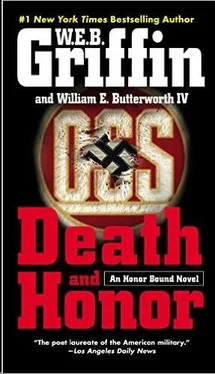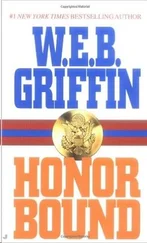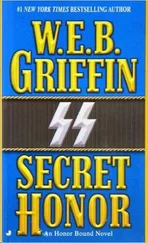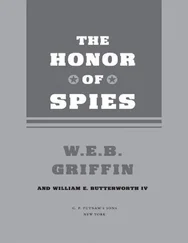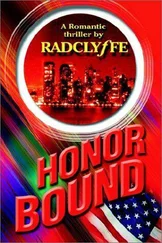Griffin W.E.B. - Honor Bound 04 - Death and Honor
Здесь есть возможность читать онлайн «Griffin W.E.B. - Honor Bound 04 - Death and Honor» весь текст электронной книги совершенно бесплатно (целиком полную версию без сокращений). В некоторых случаях можно слушать аудио, скачать через торрент в формате fb2 и присутствует краткое содержание. Год выпуска: 2009, Издательство: Penguin USA, Inc., Жанр: Старинная литература, на английском языке. Описание произведения, (предисловие) а так же отзывы посетителей доступны на портале библиотеки ЛибКат.
- Название:Honor Bound 04 - Death and Honor
- Автор:
- Издательство:Penguin USA, Inc.
- Жанр:
- Год:2009
- ISBN:нет данных
- Рейтинг книги:4 / 5. Голосов: 1
-
Избранное:Добавить в избранное
- Отзывы:
-
Ваша оценка:
- 80
- 1
- 2
- 3
- 4
- 5
Honor Bound 04 - Death and Honor: краткое содержание, описание и аннотация
Предлагаем к чтению аннотацию, описание, краткое содержание или предисловие (зависит от того, что написал сам автор книги «Honor Bound 04 - Death and Honor»). Если вы не нашли необходимую информацию о книге — напишите в комментариях, мы постараемся отыскать её.
Honor Bound 04 - Death and Honor — читать онлайн бесплатно полную книгу (весь текст) целиком
Ниже представлен текст книги, разбитый по страницам. Система сохранения места последней прочитанной страницы, позволяет с удобством читать онлайн бесплатно книгу «Honor Bound 04 - Death and Honor», без необходимости каждый раз заново искать на чём Вы остановились. Поставьте закладку, и сможете в любой момент перейти на страницу, на которой закончили чтение.
Интервал:
Закладка:
I
[ONE]
Estancia San Pedro y San Pablo Near Pila Buenos Aires Province, Argentina 1130 22 June 1943
The Fieseler Storch, a small, high-wing, single-engine aircraft, flew at one thousand feet over the verdant Argentine pampas.
The pampas—from the Indian word for “level plain”—runs from the Atlantic Ocean just south of Buenos Aires to the Andes Mountains. The flat, fertile plains cover 300,000 square miles, an area roughly half the size of Alaska, a little larger than Texas, and just about twice as big as California. The pampas has been accurately described as incredibly vast, incredibly fertile, and incredibly silent.
The Storch was freshly painted in the Luftwaffe “Spring and Summer Camouflage Scheme.” The two sergeants who had accompanied the plane to Argentina had dutifully complied with the appropriate Luftwaffe maintenance regulation, even though June in Argentina was winter.
The original idea the Wehrmacht and the Foreign Office had had was to send the airplane to Argentina and, after demonstrating its extraordinary capabilities to as many Argentine officers as possible, to give it to the Ejército Argentino as a gesture of friendship and solidarity.
Manfred Alois Graf von Lutzenberger, the slight, very thin, career diplomat who was ambassador extraordinary and plenipotentiary of the German Reich to the Republic of Argentina, had seen how useful the airplane had been in moving around the country—and especially between Buenos Aires and Montevideo, Uruguay—and somehow the gift had never been made.
The sergeants had done a good job. The random shaped patches in three shades of green and two of brown had been faultlessly applied. The black crosses identifying a German military aircraft had been painted flawlessly on both sides of the fuselage aft of the cockpit, and the red Hakenkruez of Nazi Germany had been painted in white circles on the vertical stabilizer.
There were two men in the Storch, both wearing Luftwaffe flight suits, a sort of brown coverall with many pockets. The pilot, Major Freiherr Hans-Peter von Wachtstein, was serving as the acting military attaché of the embassy until an officer of suitable rank for the position could be selected and sent to Buenos Aires to replace the attaché who had been killed.
The passenger, sitting behind von Wachtstein in the narrow fuselage, was Korvettenkapitän Karl Boltitz. Korvettenkapitän is the German naval rank equivalent to a Luftwaffe major—and to that of a U.S. Navy lieutenant commander and Army/Marine Corps major.
Both officers were tall, blond, well-set-up young men. Under their flight suits they wore nearly brand-new well-tailored woolen suits. Clothing was strictly rationed in Germany, but there was no clothing ration in Argentina— for that matter, no rationing at all—and both had taken the opportunity immediately on their arrival to buy complete wardrobes, from fine fur felt hats down to finely crafted shoes of the best Argentine leather.
On the endless rolling grass plain beneath the aircraft, von Wachtstein scanned the literally countless cattle spread as far as the eye could see. He thought their low-level flight over the pampas could have turned into a chasing of the cattle—except not one of the cows paid the slightest attention to the airplane.
Von Wachtstein switched his left hand to the stick of the Storch and gestured at the ground with his right.
Boltitz, who had been carefully studying the ground from the left window, now directed his look out the right side. He saw a sprawling, white-painted stone mansion sitting with its outbuildings in an enormous manicured garden, all set within a windbreak of a triple row of tall cedars. He nodded.
He saw, too, that there was an airstrip. He corrected himself. It was a small airfield . There was a fairly large curved-roof hangar. The tail of a light airplane protruded from the hangar’s door, and there were three more small airplanes— after a moment, he identified them as American-made Piper Cubs—parked on a paved tarmac. There was even a fuel truck.
Parked with its nose into the hangar was a large, sleek, twin-engine passenger aircraft painted a brilliant high-gloss red. It took Boltitz a moment to identify it as an American Lockheed Lodestar transport, and then another moment to call from his memory something about it. It was smaller than the standard American airliner, the Douglas DC-3, which carried twenty-one passengers—the Lodestar carried fourteen—but it was considerably faster and had a longer range.
That Lodestar , Boltitz thought, is as out of place in this setting as is the Storch. The Storch belongs on a battlefield and the Lodestar on an airport.
Von Wachtstein took the stick in his right hand again and picked up the intercom microphone.
“This is Estancia San Pedro y San Pablo,” he announced. “It takes in a few more than eight hundred eighty square kilometers.”
Boltitz had trouble believing that.
“That’s the size of Berlin,” he challenged.
“Yes, it is,” von Wachtstein said. “And more than twice the size of Vienna, and more than three times the size of Munich. I checked it in the embassy library.”
“Fantastic!”
“And my mother-in-law’s estancia, Santa Catalina,” von Wachtstein went on, “which starts a couple of kilometers to our right, is nearly as big, eight hundred and five square kilometers, more or less.”
“Mein Gott!” Boltitz exclaimed dutifully. He thought: Why the hell is he so cheerful?
Boltitz now noticed something else. There was a large open convertible— he couldn’t be sure, but it looked like a Horch—parked in the shade of the hangar. A blond young woman was sitting on the hood, looking up at them.
Boltitz found his microphone.
“There’s a blond woman looking up at us,” he said, then asked, “Is that a Horch?”
“Señora Dorotea Mallín de Frade,” von Wachtstein replied. “Mistress of all she can see. That is indeed a Horch. A 930V. One of the last to leave the factory. It belonged to Oberst Frade.”
As von Wachtstein banked the plane, Boltitz got a better look at the car. It was enormous but graceful. It had black fenders and hood, and the body was painted in red nearly as bright as the airliner.
Boltitz remembered his father, in one of the rare times he said anything that could be in any way interpreted as critical of Adolf Hitler, telling him that Der Führer had really “killed the Horch.”
“It’s actually a better car than the Mercedes,” Vizeadmiral Kurt Boltitz had said. “But since the Führer and his entourage ride around in Mercedeses, everyone with enough money to buy a car of that class naturally wants to be like our Führer.”
Boltitz thought: My God, I should have paid attention to what my father wasn’t saying. He told me to pay attention not to what Admiral Canaris was saying, but what he was not saying. I should have been smart enough to apply that to my father, too.
“And where Doña Dorotea is,” von Wachtstein went on cheerfully, “one can usually find Don Cletus. We got lucky.”
Fully aware that both his office and apartment telephones were tapped by the Sicherheitsdienst—the “security” branch of the SS—attached to the German embassy, von Wachtstein had not telephoned to tell either Doña Dorotea or her husband they were coming, or even to ascertain that either was at the estancia. He had to take the chance that one or the other was.
“Did we, von Wachtstein?” Boltitz asked sarcastically. “Did we ‘get lucky’?”
Von Wachtstein didn’t reply. He was concentrating on setting the Storch down on the four-thousand-foot-long gravel landing strip.
Not that he was going to need much of the runway. The Storch—its long, fixed, landing gear and large, high wing made it look like a stork; hence the name—could land practically anywhere and do it so slowly that it could come to a stop within a hundred feet of touchdown. Large slats fixed to the leading edge of the wing and enormous flaps gave it that ability, and the ability to take off at twenty-five miles per hour in about two hundred feet.
Читать дальшеИнтервал:
Закладка:
Похожие книги на «Honor Bound 04 - Death and Honor»
Представляем Вашему вниманию похожие книги на «Honor Bound 04 - Death and Honor» списком для выбора. Мы отобрали схожую по названию и смыслу литературу в надежде предоставить читателям больше вариантов отыскать новые, интересные, ещё непрочитанные произведения.
Обсуждение, отзывы о книге «Honor Bound 04 - Death and Honor» и просто собственные мнения читателей. Оставьте ваши комментарии, напишите, что Вы думаете о произведении, его смысле или главных героях. Укажите что конкретно понравилось, а что нет, и почему Вы так считаете.
